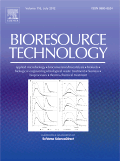
Algal Research-Biomass Biofuels and Bioproducts
Scope & Guideline
Transforming algae into tomorrow's sustainable solutions.
Introduction
Aims and Scopes
- Biomass Production and Optimization:
Research on the cultivation techniques and optimization strategies for maximizing algal biomass production, including the use of photobioreactors, nutrient management, and environmental control. - Bioremediation and Environmental Applications:
Studies focusing on the use of algae for bioremediation of wastewater, heavy metal removal, and carbon capture, highlighting their potential in environmental sustainability. - Biochemical Characterization and Value-Added Products:
Exploration of the biochemical profiles of algal species, including lipid, protein, and pigment extraction, and their applications in nutraceuticals, cosmetics, and pharmaceuticals. - Genetic Engineering and Molecular Biology:
Investigations into genetic modifications and molecular biology techniques to enhance algal productivity, stress tolerance, and bioactive compound synthesis. - Techno-Economic and Life Cycle Assessments:
Analyses examining the economic viability and environmental impact of algal production systems, including life cycle assessments of algal biorefineries. - Microalgal and Macroalgal Interactions:
Research on the interactions between microalgae and macroalgae with other microorganisms, including bacteria and fungi, and their implications for biomass production and ecosystem dynamics.
Trending and Emerging
- Integrated Algal Biorefineries:
There is a growing focus on integrated biorefinery approaches that leverage algal biomass for multiple products, including biofuels, bioplastics, and pharmaceuticals, indicating a shift towards maximizing resource utilization. - Microalgal Applications in Nutrition and Health:
Research exploring the nutritional and health benefits of microalgae, including their role in functional foods and dietary supplements, is on the rise, reflecting increased consumer interest in health-promoting ingredients. - Algal Biotechnology and Genetic Engineering:
There is an increasing trend towards genetic engineering and biotechnological applications of algae, aimed at enhancing growth rates, stress tolerance, and metabolite production, driven by advancements in molecular biology techniques. - Climate Change Mitigation and Carbon Sequestration:
Research addressing the role of algae in climate change mitigation through carbon sequestration and greenhouse gas reduction is gaining prominence, reflecting global sustainability goals. - Circular Economy and Wastewater Treatment:
The integration of algal cultivation into circular economy frameworks, particularly for wastewater treatment and nutrient recovery, is emerging as a significant area of research, highlighting the multifaceted benefits of algal systems.
Declining or Waning
- Traditional Biofuels from Algae:
Research focused on conventional biofuels derived from algae has seen a decline, possibly due to the increasing focus on more advanced and sustainable biofuel technologies that integrate multiple biomass sources. - Single-Species Cultivation Studies:
There is a noticeable decrease in research dedicated to single-species cultivation of algae, with a growing trend towards exploring mixed cultures and consortia that leverage synergistic interactions for enhanced productivity. - Basic Taxonomical Studies:
While taxonomical research remains important, the volume of papers focusing solely on the taxonomy of algal species has waned, as researchers increasingly prioritize functional and applied aspects of algal biology. - Algal Waste Utilization:
Research on utilizing algal waste has decreased, as more attention shifts towards efficient biomass production and extraction processes, reducing the focus on waste products.
Similar Journals

BMC BIOTECHNOLOGY
Advancing the Frontiers of BiotechnologyBMC Biotechnology, a leading journal in the field of biotechnology, is published by BMC and has been a pivotal platform for open-access research since 2000. With a focus on the diverse areas of biotechnology, including biochemistry, genetics, and molecular biology, this journal holds a prestigious Q2 ranking in its category for 2023 and demonstrates a commendable percentile rank in the top 66th for its Scopus listings. Operating out of the United Kingdom and covering research from 2001 to 2024, BMC Biotechnology is committed to disseminating high-quality, rigorously peer-reviewed articles that foster advancements and innovations in the biotechnology landscape. Researchers, professionals, and students alike will benefit from the journal's rich content and dedicated commitment to enhancing scientific discourse within the realm of biotechnology.

CRITICAL REVIEWS IN BIOTECHNOLOGY
Elevating Biotechnological Discourse with Rigorous ReviewsCRITICAL REVIEWS IN BIOTECHNOLOGY, published by Taylor & Francis Ltd, stands as a leading journal in the field of biotechnology, consistently recognized for its rigorous peer-reviewed articles that impact the disciplines of Applied Microbiology, Biotechnology, and Medicine. With an impressive Q1 ranking in these categories and a significant influence reflected in its Scopus rankings—placing it within the top 5% of Applied Microbiology and the top 4% of Biotechnology journals—the journal serves as an essential resource for researchers, professionals, and students alike. Launched in 1983 and extending its coverage to encompass groundbreaking findings through 2024, it provides a rich forum for insightful reviews and innovative research that propel the field forward. Though not an Open Access journal, CRITICAL REVIEWS IN BIOTECHNOLOGY remains a vital point of reference for ongoing developments, critical analyses, and emerging trends, making it indispensable for those seeking to stay at the forefront of biotechnological advancements.

Applied Biological Chemistry
Bridging Research and Application in Biological Chemistry.Applied Biological Chemistry, published by SPRINGER SINGAPORE PTE LTD, is a premier open access journal that has been serving the biological sciences community since 2016. With an ISSN of 2468-0834 and E-ISSN of 2468-0842, this journal is committed to disseminating high-quality research in the fields of Biochemistry, Genetics, Molecular Biology, and Organic Chemistry. The journal holds a commendable position within the scientific community, ranking in the Q2 quartile for both Biochemistry and Organic Chemistry niches as of 2023. It aims to foster innovative research and facilitate discussions that propel the understanding of complex biochemical processes and molecular techniques. By providing open access to its contents, Applied Biological Chemistry ensures that valuable research is readily available to researchers, professionals, and students globally, encouraging collaboration and knowledge sharing in this rapidly evolving discipline. Its pivotal role in enhancing scientific communication in the Netherlands and beyond is further underscored by a steadily increasing impact in the academic arena.

Biofuel Research Journal-BRJ
Leading the charge in biofuel research and environmental science.Biofuel Research Journal (BRJ) is a premier open-access publication that has been at the forefront of advancing knowledge in the field of biofuels since its inception in 2014. Published by Alpha Creation Enterprise in Malaysia, BRJ disseminates high-quality research that spans multiple disciplines, including Biotechnology, Chemical Engineering, and Environmental Science. With an impressive Q1 ranking across various categories in 2023 and a robust Scopus ranking positioning it among the top journals in its field, BRJ is dedicated to promoting innovative solutions that address contemporary energy challenges. The journal serves as a vital resource for researchers, professionals, and students engaged in sustainable energy, offering a platform for sharing cutting-edge findings and fostering interdisciplinary collaboration. With its commitment to open access, BRJ ensures that its content is widely available, supporting the global pursuit of renewable energy and environmental stewardship.

Biofuels Bioproducts & Biorefining-Biofpr
Exploring the Frontiers of Renewable Energy and BioproductsBiofuels Bioproducts & Biorefining (Biofpr), published by WILEY, stands at the forefront of research dedicated to the sustainable production and utilization of biofuels and bioproducts. With its robust impact, as evidenced by its placement in the Q2 quartile across both Bioengineering and Renewable Energy, Sustainability and the Environment categories, this journal provides a vital platform for disseminating high-quality research aimed at advancing bio-refining technologies and bio-product innovations. Covering a wide range of topics from production methodologies to environmental impacts, Biofpr serves as an essential resource for researchers, professionals, and students eager to contribute to the evolving领域 of renewable energy solutions. Its consistent performance in the Scopus rankings further underscores its importance, ranking #78 in Renewable Energy and #51 in Chemical Engineering, making it an indispensable read for those committed to sustainability and scientific advancement in the biofuels sector.

BIOSYSTEMS ENGINEERING
Fostering dialogue for groundbreaking agricultural research.BIOSYSTEMS ENGINEERING, published by Academic Press Inc. Elsevier Science, is a leading journal that has established itself as a key contributor in the fields of agronomy, crop science, animal science, food science, soil science, and control systems engineering. With an impressive position in the 2023 Category Quartiles, featuring Q1 rankings in Agronomy and Crop Science, Animal Science and Zoology, Food Science, and Soil Science, alongside a Q2 ranking in Control and Systems Engineering, this journal stands at the forefront of innovative research. Currently indexed in Scopus, it boasts a commendable track record, with its Agricultural and Biological Sciences rankings placing it in the 95th percentile for Agronomy and Crop Science and the 90th percentile for Soil Science, among others. With a commitment to disseminating critical advancements and fostering scientific dialogue, BIOSYSTEMS ENGINEERING offers an invaluable platform for researchers, professionals, and students alike, seeking to advance their understanding and application of engineering principles in biological systems. As a hybrid journal that provides both subscription and open access options, it ensures broad accessibility to high-quality research that shapes the future of sustainable agriculture and biological systems.

BIOTECHNOLOGY ADVANCES
Innovating Solutions for a Sustainable FutureBIOTECHNOLOGY ADVANCES is a premier, peer-reviewed journal published by PERGAMON-ELSEVIER SCIENCE LTD, dedicated to advancing knowledge in the rapidly evolving fields of biotechnology and bioengineering. With an ISSN of 0734-9750 and an E-ISSN of 1873-1899, this esteemed journal covers a wide spectrum of topics relevant to applied microbiology, molecular biology, and biochemical innovation. Recognized for its academic rigor, it holds a distinguished position in the top quartile (Q1) in multiple categories, including Applied Microbiology and Biotechnology, Bioengineering, and Biotechnology, further evidenced by its high rankings in Scopus, where it ranks #3/127 in Applied Microbiology and Biotechnology and #7/311 in Biotechnology. Researchers and professionals in the field value the journal not only for its comprehensive coverage of cutting-edge research but also for its commitment to disseminating critical findings and fostering collaboration. While BIOTECHNOLOGY ADVANCES currently operates under a subscription model, its potential impact on future innovations in biotechnology cannot be overstated, making it an essential resource for anyone interested in the forefront of biotechnological advancements.

BIORESOURCE TECHNOLOGY
Empowering Change with Groundbreaking Bioresource InnovationsBioresource Technology, published by Elsevier Science Ltd, is a leading journal in the fields of bioengineering, environmental engineering, and sustainable resource management. With an impressive impact factor reflected in its Q1 rankings for 2023 across multiple relevant categories, it stands out as a premier source for groundbreaking research from its inception in 1991 to its anticipated contributions through 2024. Bioresource Technology promotes the advancement of technologies and methodologies aimed at the sustainable utilization of biological resources, playing a pivotal role in tackling the challenges of waste management, renewable energy, and environmental protection. Researchers and practitioners are encouraged to contribute and engage with high-quality studies that have significant implications for the global push towards sustainability and innovation. Although the journal does not currently offer Open Access, its subscription model ensures that the rigorous peer-reviewed content remains accessible to those dedicated to advancing the field.

Biotechnology for Biofuels and Bioproducts
Transforming Energy Landscapes with Cutting-Edge Biotechnological InsightsBiotechnology for Biofuels and Bioproducts is a premier international journal published by BMC, situated in the United Kingdom, focusing on the critical intersection of biotechnology and sustainable energy solutions. Established as an Open Access platform in 2022, this journal aims to disseminate high-quality research that advances our understanding of biofuels, bioproducts, and their applications within environmental sustainability. With its commendable Q2 ranking in multiple relevant categories including Applied Microbiology and Biotechnology and Renewable Energy, this journal serves as a vital resource for researchers, industry professionals, and students seeking to explore innovative biotechnological approaches to address global energy challenges. The journal emphasizes interdisciplinary research, fostering collaboration among scientists in biotechnology, environmental science, and policy-making. As it continues to publish impactful findings until 2024, Biotechnology for Biofuels and Bioproducts remains essential for those dedicated to advancing sustainable methodologies in energy and resource management.

PHYCOLOGIA
Empowering Research in Phytobiological SciencesPHYCOLOGIA is a prestigious academic journal published by Taylor & Francis Ltd, specializing in the fields of Aquatic Science and Plant Science. With an ISSN of 0031-8884 and an E-ISSN of 2330-2968, the journal has established itself as an influential platform for disseminating high-quality research on algal biology and its ecological significance. Renowned for its rigorous peer-review process, PHYCOLOGIA is categorized in the Q2 quartile for both Aquatic Science and Plant Science as of 2023, reflecting its solid reputation and contribution to the respective fields, evidenced by Scopus ranks placing it in the top tiers of research outputs. The journal offers access to a wealth of knowledge, embracing studies that range from fundamental aspects of phycology to applied environmental sciences, making it a vital resource for researchers, professionals, and students who seek to advance their understanding of aquatic and plant ecosystems. With a focus on innovative methodologies and interdisciplinary approaches, PHYCOLOGIA invites submissions that push the boundaries of current knowledge and contribute to the global discourse on phytobiological sciences.